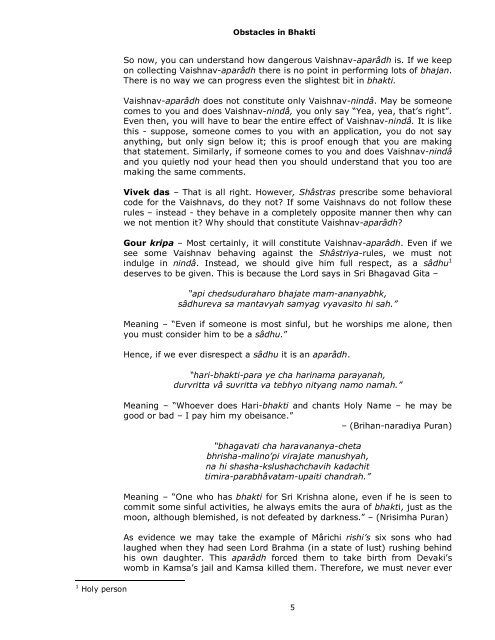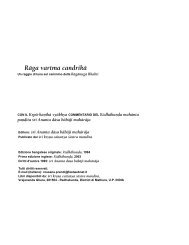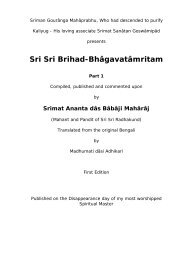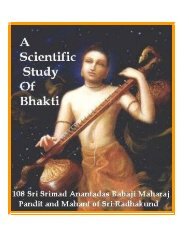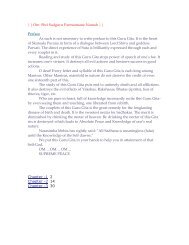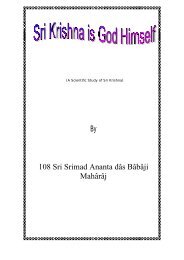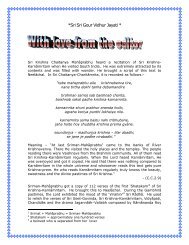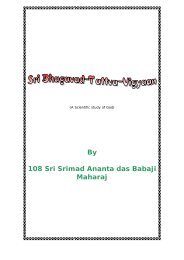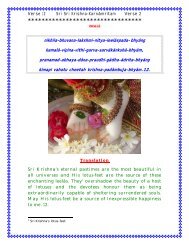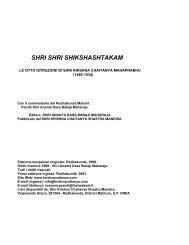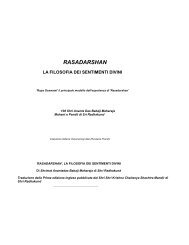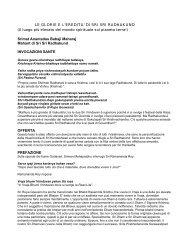Obstacles Bhakti - Kunjeshwari Home
Obstacles Bhakti - Kunjeshwari Home
Obstacles Bhakti - Kunjeshwari Home
You also want an ePaper? Increase the reach of your titles
YUMPU automatically turns print PDFs into web optimized ePapers that Google loves.
1 Holy person<br />
<strong>Obstacles</strong> in <strong>Bhakti</strong><br />
So now, you can understand how dangerous Vaishnav-aparâdh is. If we keep<br />
on collecting Vaishnav-aparâdh there is no point in performing lots of bhajan.<br />
There is no way we can progress even the slightest bit in bhakti.<br />
Vaishnav-aparâdh does not constitute only Vaishnav-nindâ. May be someone<br />
comes to you and does Vaishnav-nindâ, you only say “Yea, yea, that’s right”.<br />
Even then, you will have to bear the entire effect of Vaishnav-nindâ. It is like<br />
this - suppose, someone comes to you with an application, you do not say<br />
anything, but only sign below it; this is proof enough that you are making<br />
that statement. Similarly, if someone comes to you and does Vaishnav-nindâ<br />
and you quietly nod your head then you should understand that you too are<br />
making the same comments.<br />
Vivek das – That is all right. However, Shâstras prescribe some behavioral<br />
code for the Vaishnavs, do they not? If some Vaishnavs do not follow these<br />
rules – instead - they behave in a completely opposite manner then why can<br />
we not mention it? Why should that constitute Vaishnav-aparâdh?<br />
Gour kripa – Most certainly, it will constitute Vaishnav-aparâdh. Even if we<br />
see some Vaishnav behaving against the Shâstriya-rules, we must not<br />
indulge in nindâ. Instead, we should give him full respect, as a sâdhu 1<br />
deserves to be given. This is because the Lord says in Sri Bhagavad Gita –<br />
“api chedsuduraharo bhajate mam-ananyabhk,<br />
sâdhureva sa mantavyah samyag vyavasito hi sah.”<br />
Meaning – “Even if someone is most sinful, but he worships me alone, then<br />
you must consider him to be a sâdhu.”<br />
Hence, if we ever disrespect a sâdhu it is an aparâdh.<br />
“hari-bhakti-para ye cha harinama parayanah,<br />
durvritta vâ suvritta va tebhyo nityang namo namah.”<br />
Meaning – “Whoever does Hari-bhakti and chants Holy Name – he may be<br />
good or bad – I pay him my obeisance.”<br />
– (Brihan-naradiya Puran)<br />
“bhagavati cha haravananya-cheta<br />
bhrisha-malino’pi virajate manushyah,<br />
na hi shasha-kslushachchavih kadachit<br />
timira-parabhâvatam-upaiti chandrah.”<br />
Meaning – “One who has bhakti for Sri Krishna alone, even if he is seen to<br />
commit some sinful activities, he always emits the aura of bhakti, just as the<br />
moon, although blemished, is not defeated by darkness.” – (Nrisimha Puran)<br />
As evidence we may take the example of Mârichi rishi’s six sons who had<br />
laughed when they had seen Lord Brahma (in a state of lust) rushing behind<br />
his own daughter. This aparâdh forced them to take birth from Devaki’s<br />
womb in Kamsa’s jail and Kamsa killed them. Therefore, we must never ever<br />
5


